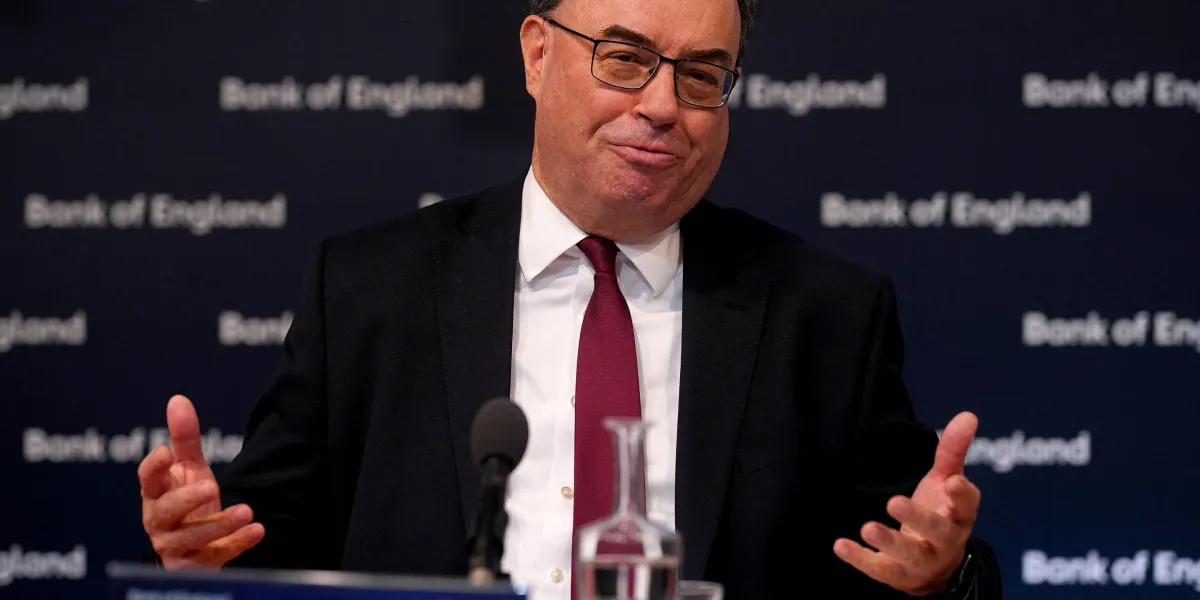Bank of England makes first interest rate cut since pandemic in nail-bitingly close vote
The Bank of England cut interest rates for the first time since early 2020 and signaled further cautious reductions ahead, offering some relief to households after a year of the UK’s highest borrowing costs for a generation.
Governor Andrew Bailey’s casting vote clinched the quarter-point drop in the benchmark to 5%. The decision was “finely balanced” for some of those supporting the move, and opposed by a minority of four on the nine-member Monetary Policy Committee, according to minutes of the meeting.
The pound trimmed losses against the dollar and UK bonds held gains after the decision. Sterling traded 0.5% weaker at $1.2791, while the yield on 10-year gilts was three basis points lower. Traders added to wagers on further reductions this year, pricing around 35 basis points of easing by December.
The BOE offered no specific guidance on where rates may settle, nor of the speed of cuts needed to get there. Officials will simply study and react to the facts at each of their forthcoming gatherings, the governor said.
“I’m not giving you any view on the path of rates to come — I’m saying we will go from meeting to meeting, as we always do,” Bailey told reporters in London. “We’ve become sufficiently confident now that we think we can reduce that degree of restrictiveness a bit, and we will go on making that judgment.”
What Bloomberg Economics says…
“The Bank of England delivered a cautious cut at its August meeting, a signal that progress has been made in the battle against inflation but the war is yet to be won. The Monetary Policy Committee gave no detailed guidance on the timing of the next move down, but the tone of the minutes suggests it’s in no rush to reduce rates again. We expect another cut in November.”
—Bloomberg UK Economists Ana Andrade and Dan Hanson. Read their full analysis on the Terminal.
The decision is an early gift to Prime Minister Keir Starmer’s new Labour government and will bolster arguments that his Conservative predecessor, Rishi Sunak, called last month’s election too early.
The rate cut aligns the BOE with a slow-to-start bandwagon of easing across advanced economies, possibly soon joined by the US Federal Reserve after Chair Jerome Powell signaled on Wednesday that officials are on course to cut rates in September unless inflation progress stalls.
Displaying similar caution to such global peers, Bailey insisted in an accompanying statement that the BOE is in no rush to ease policy.
“Inflationary pressures have eased enough that we’ve been able to cut interest rates today,” he said. “But we need to make sure inflation stays low, and be careful not to cut interest rates too quickly or too much.”
Even so, the bank’s forecasts point to a steeper path of rate cuts over the next three years than investors were expecting. On market assumptions that rates fall to 4.1% in 2025 and 3.5% in three years’ time, inflation is at 1.7% after two years and 1.5% after three — well below the 2% target.
“This is a hawkish cut. They are just removing restrictiveness, rather than easing,” said Athanasios Vamvakidis, head of G-10 FX strategy at Bank of America. “I see limited impact on the pound. They are not committing to anything. They will go meeting by meeting, remaining data dependent.”
While UK inflation is back at the desired level, underlying pressures remain uncomfortably high. The BOE said the headline gauge of consumer-price growth will bounce back to 2.7% by the end of the year, and that what happens after that depends on how wages and services prices evolve.
Inflation risks will remain “skewed to the upside throughout the forecast period,” the central bank said in its documents. “Monetary policy would need to continue to remain restrictive for sufficiently long until the risks to inflation returning to the 2% target in the medium term had dissipated further.”
The committee decided to cut despite stickier underlying inflation than hoped and stronger growth than anticipated — both elements cited by the minority that opposed the move in a vote that was the MPC’s tightest since September 2023.
Services inflation was 5.7% in June, well above the BOE’s forecast for 5.1%, and wage growth has dropped only slowly.
The economy is also rebounding from recession more strongly than expected. The BOE upgraded growth for this year to 1.25% from 0.5%, but left projections for 2025 and 2026 unchanged at 1% and 1.25%.
For the five members who voted to reduce rates, “there had been some progress in moderating risks of persistence in inflation,” the minutes said.
Business surveys pointed to “waning wage and price pressures.” For some of those officials, the decision was “finely balanced” as inflationary persistence “had not yet conclusively dissipated.”
Alongside Bailey, Clare Lombardelli, the new deputy governor for monetary policy, backed the reduction in what was her first meeting. They were joined by deputy governors Sarah Breeden and Dave Ramsden, as well as external member Swati Dhingra.
“Data is evolving broadly in line with our expectations,” Lombardelli told reporters. “That gives you more confidence that you’re in this world where inflationary pressures are reducing.”
Chief Economist Huw Pill and external policymakers Jonathan Haskel, Megan Greene and Catherine Mann preferred to hold. It was Haskel’s last vote. In June, only two members supported a cut.
“This was clearly not a straightforward policy move, as evidenced both by the vote split and the finely balanced nature for a number of MPC members,” said Hetal Mehta, head of economic research at St. James’s Place. “The pace of cuts will become an increasing part of the debate, but big and/or back-to-back moves would be reserved for an economic shock.”
The reduction will come as welcome relief for mortgage borrowers and business after 12 months with rates stuck at a 16-year high, and offers the new government an initial boon.
Starmer and his chancellor, Rachel Reeves, have been in office less than a month and have promised to boost growth to fix the UK’s ailing public services. Lower rates will help growth and bring down debt-servicing costs, giving the government more money for its spending priorities.
The BOE was briefed on the chancellor’s policy changes on Monday, when public-sector workers were awarded a £10 billion ($12.8 billion) pay rise, but officials did not include them in the August projections. The effects on the fiscal stance will be in the November forecast following the full budget on Oct. 30.
While Reeves hailed the rate decision as “welcome news,” she noted in a statement that millions of families were still facing elevated mortgage rates and reiterated warnings that “difficult decisions” will be necessary to fix Britain’s economy.




